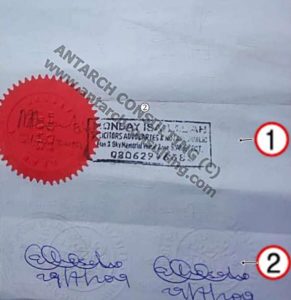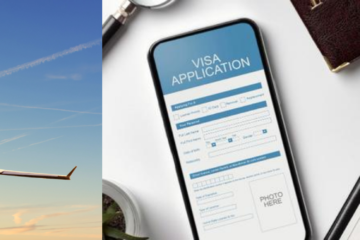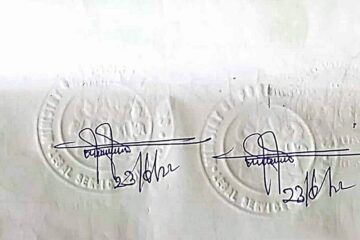The terms ‘notarization’ and ‘authentication’ are often misconstrued when people set out to authenticate, legalize or attest their academic results, birth certificate, marriage certificate, and other documents in Nigeria for use abroad. To make things simpler, Antarch Consulting provides much-needed clarification by explaining the difference between notarization and authentication of documents intended for use in a foreign country. To begin with, you should note that authentication of documents broadly means the same thing as attestation of documents or legalization of documents.
What It Means to Notarize a Document (Notarization Explained)
At the most basic level, the red, star-like, circular rubber seal on a document (often accompanied by a stamp bearing the name, address, and contact details of the Notary Public) appended on a document is a sure sign that that document has been notarized. But what does this red seal and stamp signify?
To notarize a document essentially means to endorse the genuineness of that document and to affirm that the facts contained therein are reasonably deemed to free of misrepresentation and falsification. Notarization also means that the Notary Public whose seal and stamp is appended on the document has verified the identity of the signee of the document and is aware of the legal context or basis for the transaction.
Certain institutions or authorities (e.g. embassies or high commissions) insist on notarization of documents presented to them so they may have full faith in the validity of such documents. In effect, notarization confers an additional layer of credence or trustworthiness upon a document and/or the transaction it signifies.
In Nigeria, notarization of documents is performed by a certified Notary Public, who is often a lawyer that has been practicing at the Bar for a minimum of Seven years and has applied for and received the accreditation by the Chief registrar of the Supreme Court of Nigeria. A Notary Public is ceremoniously considered an officer of the Supreme Court.
What It Means to Authenticate or Attest a Document (Authentication/Attestation Explained)
First, it is important to note that authentication is the same thing as apostille or attestation of documents. To authenticate a document means to attest or certify that such a document is legal, genuine, and validly issued to the bearer by the claimed authority responsible for issuing such a document.
In other words, if you have a document like the official birth certificate issued by the National Population Commission of Nigeria (NPC) or a Marriage Certificate, authenticating such a document means getting it endorsed by the appropriate authorities whose attestation or certification of such a document effectively confers legitimacy on it for use abroad. The appropriate authority responsible for authentication of documents in Nigeria is the Ministry of Foreign Affairs in Abuja.
However, if you have an academic result (such as WAEC or Degree Certificate), there are two layers to authenticating such a document. Since it is an educational document, it must first be certified by the Ministry of Education (which would ascertain and attest to its genuineness) and then subsequently authenticated by the Ministry of Foreign Affairs. Only after this dual process is completed will the educational document be deemed authenticated and presentable to embassies (for legalization) or to foreign authorities.
For Nigerians who have a foreign degree or similar academic certificates from a foreign educational institution, in order to authenticate such documents in Nigeria, you first need to get them endorsed by the embassy of the country where you studied. For example, if you studied in Ghana, you must take the degree certificate to the Ghana High Commission in Nigeria for verification/endorsement. After this is done, you will then be able to authenticate the document directly at the Ministry of Foreign Affairs – without the need to go through the Ministry of Education attestation as is the case for academic certificates issued by Nigerian institutions.
Is it Important to Notarize a Document Before I Can Authenticate It?
Notarization and authentication of documents often go hand in hand when the purpose is to use your Nigerian document in a foreign country. However, this is not strictly so. It is not always necessary to notarize a document before authenticating it in order to use it abroad. This requirement varies from one embassy to the other or one country to the other. You should find out from the relevant authorities (embassy or institution where you will submit the document abroad) whether notarization and authentication need to be done on a particular document you intend to use in that country.
Based on our experience as the premier attestation services company with specialization in the authentication of documents in Nigeria, we know for sure that notarization and authentication must be done together for documents to be submitted to the Embassy of China and Embassy of Qatar. In other words, if you want to use a document (such as your school certificates, police character certificate, birth certificate, marriage certificate, etc) in China or Qatar, it is not only sufficient to authenticate it at the Ministry of Foreign Affairs, you must also notarize such a document in order for it to be admissible for legalization and use in these countries. In this case, notarization and authentication of documents must go hand in hand.
Please note that this notarization and authentication requirement may not only apply to China and Qatar-bound documents. It may also apply to a number of other countries or embassies, and it is important for you to find out before you commence the authentication process.
See the image below for an example of a document that has been notarized and also authenticated in Nigeria. Notice the difference.
By the Way, What is Legalization of Documents?
Although the term ‘legalization’ is often used interchangeably with authentication, its more accurate meaning has to do with the procedure performed by the embassy of the destination country where the document is to be used. In effect, the embassy will ‘legalize’ a document already authenticated by the Nigerian Ministry of Foreign Affairs.
To legalize a document makes it legal to use it in the embassy’s home country. For example, if the Chinese Embassy in Nigeria legalizes your degree certificate, it makes it legal to use that result to apply for a higher academic program in China or even use it to look for employment in China. Similarly, if the Embassy of Poland in Nigeria legalizes your birth certificate, it means that the birth certificate has become a legal document in Poland which you can use for any official purpose – such as processing your residency permit, citizenship, marriage, and so forth.
Professional Assistance for Notarization and Authentication of Documents
If you are based outside Abuja (or even outside Nigeria), and you need Antarch Consulting’s agency assistance for the frustrating process of notarization, authentication, or legalization of your Nigeria-issued documents, you may want to contact us to discuss how we could assist you.




0 Comments